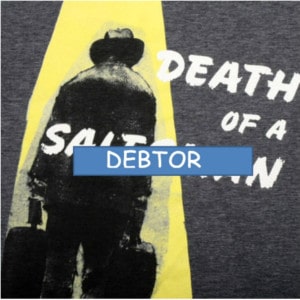 When you think of death of a debtor, you can’t help but be reminded of Death of a Salesman, Arthur Miller’s Pulitzer Prize winning play written in 1949 and still timely today. The play was essentially an attack on the American dream of materialism as embodied by the central character, Willy Loman. His entire life he lived paycheque to paycheque, waiting for his big break that never came. All the while the debts kept piling up. One day Willy Loman was fired and as a result he took his own life leaving his family to deal with the death of a debtor.
When you think of death of a debtor, you can’t help but be reminded of Death of a Salesman, Arthur Miller’s Pulitzer Prize winning play written in 1949 and still timely today. The play was essentially an attack on the American dream of materialism as embodied by the central character, Willy Loman. His entire life he lived paycheque to paycheque, waiting for his big break that never came. All the while the debts kept piling up. One day Willy Loman was fired and as a result he took his own life leaving his family to deal with the death of a debtor.
Thank you for reading our Brandon's Blog. Check out our AI insolvency bot on this page and don't forget to subscribe!
From time to time, we are consulted regarding insolvent estates of deceased persons.
When the death of a debtor occurs, who is responsible for the debts?
- Although some creditors may try to collect from the spouse or other family members, debts do not transfer by virtue of marriage or death unless the debt is “joint” in which case the survivor will be required to pay the balance of the account.
- Debts are normally paid out of the assets of the estate of the deceased before distributions are made to heirs (before any money can be distributed to heirs, all the proven debts must be paid).
- If the estate is insolvent (the assets of the estate are not sufficient to pay the debts), then the order of payment is normally prescribed by provincial legislation.
- If warranted, the executors can make application to Bankruptcy Court for an order allowing them to assign the deceased’s estate into bankruptcy. In that event, then the Bankruptcy and Insolvency Act (Canada), the federal legislation, will prescribe the order of payment.
- If there is no money in the estate to pay the debt and if the debt is only in the name of the deceased person, the credit grantor will be left with no option but to write off the debt as uncollectible.
Some debts may be extinguished upon the death of the debtor:
- Insured mortgages
- Insured loans
- The Canada Student Financial Assistance Act provides for some student loans to be repaid by the federal government in the event of the student’s death or permanent disability.
Make sure you know and understand the state of your finances before you have to deal with death of a debtor. If you’re living from paycheque to paycheque and on the edge of financial disaster, contact a professional trustee today. The Ira Smith team can help you solve your financial problems with immediate action and the right plan so that Starting Over, Starting Now you can enjoy financial freedom.
